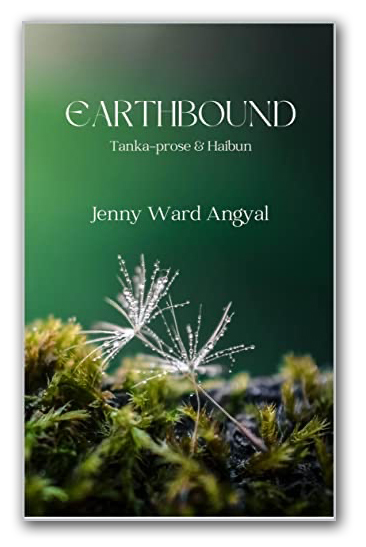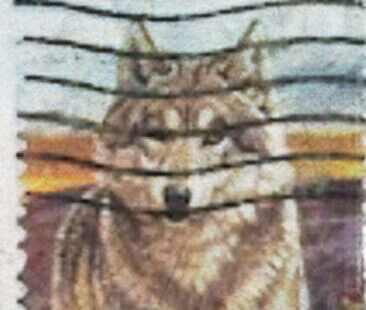
Book Review:
Earthbound: Tanka-prose & Haibun
By Jenny Ward Angyal
Windy Knoll Press
2022, Paperback, 54 pp.
Kindle Direct Publishing
ISBN: 979-8-833359-5-25
$5.99; free to members of Kindle Unlimited
Ordering Information
After you perhaps settle in a favorite chair and thumb to the first of 27 works in Earthbound—the latest book of haibun and tanka prose by Jenny Ward Angyal—you will be welcomed with the following piece that reads almost like prayer.
my breath is the wind
that carries a leaf with rain in its veins
down to the earth that built my bones
from fire and clayfloating
behind my eyelids
the cosmos

With its allusion to the “Story of Creation” in Genesis, it is an apt starting point for a collection that, through personal stories, reflects primarily on the past, present, and future of our planet. The book’s six haibun and 21 tanka prose vary in construction: some follow the “basic unit” style (one paragraph, one poem), while others offer multiple poems woven throughout the prose. (There’s also one tanka sequence, “Tipping Point,” that serves as something of an introduction to the collection.) Regardless of form, the poems in Earthbound reflect the spirit of an author in touch with woods and wilderness, and who understands the connection between every living thing.
In her bio, the poet shares that she “spent her childhood wandering the woods and fields of rural Connecticut, where she attended a one-room schoolhouse and composed her first poem at the age of five.” And later, as an adult, she would spend “a number of years studying and writing about biology. . .” Her love of the natural world, right down to the cellular level, can be seen throughout the book. Angyal can span eons within a few paragraphs, conveying her acute awareness of human beings’ effect on other species and the planet itself. For example, the follow tanka prose introduces readers to the extinction of woolly mammoths.
Dust to Dust
they gather
round the body
of the matriarch. . .
stroke in silence
the cooling fleshI mean to write
of the death of elephants
but see instead
my mother’s face
waxen and sereneI lay down my pen and idly trace the curve of an earring. It’s made of woolly mammoth ivory dug from Alaskan permafrost and echoes the curve of a tusk thirteen feet long, from a beast that died 13,000 years ago.
Angyal goes on to say that, while humans consider resurrecting, through DNA, the animal they hunted to extinction, the animal’s descendants are still being hunted in Africa. The cycle continues—a point that’s emphasized in the concluding tanka, where the elephants’ ivory makes another appearance:
a clock ticks
on the pawnshop wall—
pieces
of the ivory chess set
missing
Other tanka show the ravages of pollution and effects of climate change, although her spirit still remains hopeful:
the belly
of a sea turtle stuffed
with styrofoam . . .
such strange fruits we offer
to our mother of mothers
(from “Bread of Life”)smoke
from distant wildfires
fills my lungs . . .
I dream of the blue planet,
one seed sprouting in ash
(from “But Now We Are Many”)floundering
in the rising seas
of change,
I haul out—clinging
to a flimsy raft of hope
(from “Deletions”)
In the title tanka prose, “Earthbound,” Angyal reflects further on these ravages. It opens with the poet as a child:
A little hop and I’m airborne, arms outstretched, hovering under the arching limbs of the elm. The tip of my father’s cigarette glows among winking fireflies. No one knows I’m there. Fragments of adult conversation drifted upward to mingle with the rustling of leaves.
Taking full advantage of the childhood images that readers are now holding in their minds, Angyal segues to the present and drifts into a real but dreamlike state:
Not since childhood have I flown on the wings of a dream. And yet . . .
surrounded
by a cloud of swallows
on the wing
I become invisible
. . . I become sky
And as “sky” Angyal sees all . . . Now, the magic of being airborne has been grounded in the reality of what has been wrought by modern-day capitalism.
space junk—
joy-rides for the wealthy
leaving
the world we have
a little hotter
“Earthbound” ends on note of concern, along with heightened awareness and perhaps resolve:
On my morning walk ten days later, the sky is thick with haze and the smell of smoke hangs heavy in the air. Three thousand miles away, on the opposite side of the North American continent, the forests are burning.
south of someday
stenciled on a sign—
the arrow
points me homeward
to the earth beneath my feet
Where else will readers find the poet in this thought-provoking collection? Woods and forests, farmland, marshland… She brings these places alive for the reader, and connects them to a larger spirit that’s universal, as in this example from “Moonstruck”:
I hear Voices all the time. Sometimes the chorus sounds like silver sleigh bells in the distance, but sometimes it’s almost deafening. I hear trees trilling in the darkness, the sound of invisible sheep bleating in roadside ditches. Guttural snores and the twanging of plucked rubber bands emanate from the pond bank, amid the ceaseless clicking of a thousand pebbles. Sometimes the Voices are so high and pure, they’re almost subliminal, more felt than heard.
***
shutters
open to starlight,
she listens. . .
the universe
is humming
While Earthbound may focus primarily on nature, she does not ignore how human beings are also among the creatures connected to one another. In her haibun “Insight”, she compares the gaze of her newborn granddaughter “fixed intently on my face” to mouse pups “born with their eyes shut.” She concludes with this haiku:
dreaming
what I don’t yet know –
seeds on the wind
What the future holds for our planet remains to be seen. But after finishing this outstanding collection, I now have an even greater appreciation for Angyal’s voice and the fifteen simple yet complex words that open the book:
this book is dedicated
to three-and-a-half billion years
of life on Earth
About the Reviewer

Tish Davis lives in Northern Ohio. Her tanka and related forms have appeared in numerous online and print publications. When she isn’t busy with work and grandchildren she enjoys exploring the local parks with her husband and three dogs.

eternal spinning
asleep until we wake up
with storytelling